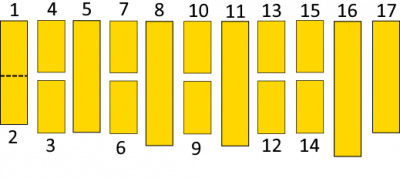Cartridge
Pinout
| Pin | Name | Direction | Description |
|---|---|---|---|
| 0 | IRQ? | Output | Always wired to GND inside game cartridge; Possibly used for interrupt signaling |
| 1 | RCLK | Output | Return clock; Game cartridge sends back CLK signal delayed by a few ns |
| 2 | CLK | Input | Clock, 25MHz |
| 3 | CS | Input | Chip select; Switch pulls this LOW during a transfer |
| 4 | DAT0 | Inout | Data bus pin 0 |
| 5 | DAT1 | Inout | Data bus pin 1 |
| 6 | VCC 3.3v | Input | |
| 7 | DAT2 | Inout | Data bus pin 2 |
| 8 | DAT3 | Inout | Data bus pin 3 |
| 9 | VCC 1.8v | Input | |
| 10 | DAT4 | Inout | Data bus pin 4 |
| 11 | DAT5 | Inout | Data bus pin 5 |
| 12 | DAT6 | Inout | Data bus pin 6 |
| 13 | DAT7 | Inout | Data bus pin 7 |
| 14 | GND | ||
| 15 | RST | Input | Reset, active LOW. |
All IO use 1.8V for logic HIGH and 0V for logic LOW.
Protocol
Switch game cartridges use a simple (but Nintendo proprietery) SPI-like bus with 8-bit width (DAT7..0). It is very similar to the bus interface of 3DS game cartridges, except with very different commands.
The Switch host starts a transfer by first pulling CS low, followed by clocking a byte each clock cycle. The bus data will always be ready before the rising edge of the CLK signal, so that it can be captured on the rising edge. After command bytes are written to the bus, the direction of the bus implicitly changes and the game cartridge responds. The Switch host keeps clocking while the game cartridge responds. After the transfer is ended, the CS line is pulled high again.
Commands are 16 bytes long, and followed immediately by a 4-byte CRC-32 over the command bytes. After this, the bus direction changes, and the bus will be 'floating' for a few cycles (TBD figure out if cartridge can respond with NAK over bad CRC during floating bus).
Before the game cartridge responds with the actual response data, it will send busy bytes (LSB will be zero) to the Switch host, until it is ready to send the real response. When the game cartridge is ready, it will send 2 acknowledgement bytes (LSB will be one) to let the Switch host know. After this, the game cartridge will send the actual response bytes.
The actual response bytes are also followed immediately by a 4-byte CRC-32 over the actual response bytes.
Commands
| Command | Description |
|---|---|
5B000000000000010000000000000000
|
|
5B000000000000010000000000000000
|
|
56000000000000000000000000000000
|
|
28000000000000000000000000000000
|
|
A5000000000000000000000000000000
|
|
56000000000000000000000000000000
|
|
28000000000000000000000000000000
|
|
5B000000380000010000000000000000
|
|
E2000000000000000000000000000000
|
|
E0000000000000000000000000000000
|
|
200838A25A344F818ABB6456694D4E8D
|
|
7EE41FDF12C01C157CC899910673A0CF
|
|
263C8230EC15FAE3CE79365BD850F4BD
|
|
B6FDA6F37FFA29E18831D0B217DFBDBE
|
|
7B97F7DF07240AA9870E1C974336FA8A
|
The meaning of some these commands are currently unknown.
Encryption
After a few initial plaintext commands, the Switch instructs the game cartridge to enter into encrypted mode. From that point on, commands and responses are sent encrypted over the bus. The encryption algorithm used is currently unknown.
1,2 Switch
Credit images: smiba (link)
Description
- Package: TSOP-48
- Manufacturer: Unknown
Frontside
Frontside (bare)
Backside
Zelda: Breath of the wild
Credit images: Retr0id (link)
Description
- Package: Custom
- Manufacturer: Macronix (MX)
Overview
Frontside
Backside
Schematic
Credit images: smiba (link)
